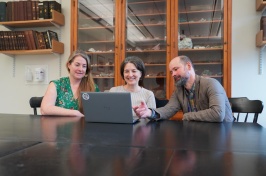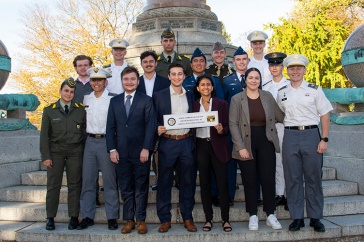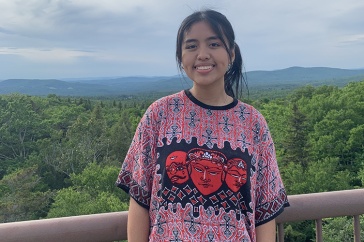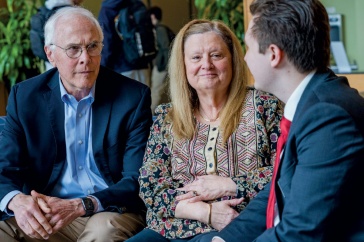
James Smugereski ’19 never planned on working for a nonprofit. He was a business major, with a focus in finance. He interned at one of the country’s largest insurance companies — twice — and thought maybe he’d go into financial planning.
But Smugereski had completed another internship earlier in his college career. One that he sort of fell into after receiving an email from UNH’s Center for Social Innovation and Enterprise announcing the opportunity to earn 16 credits while spending a semester in Boston working for an organization focused on doing good.

It was Smugereski’s first year of college, and his goal was to get as much experience in as many areas as he could to better prepare him for the future. So, during the fall semester of his sophomore year, the New Hampshire native joined 11 other UNH students in the inaugural cohort of Semester in the City. A new program at UNH, Semester in the City came out of a partnership with Boston’s nonprofit College for Social Innovation to offer undergraduates the chance to spend 15 weeks in Boston interning at leading social change organizations in areas such as community development, education, the environment, health and social justice. In addition to 30 hours of internship work each week, students tackle an intensive evening course on various approaches to social change, Friday seminars and workshops and a special project.
Smugereski was placed with Union Capital Boston, a loyalty program that helps low-income families build resumes of volunteerism and activism by providing social and financial service rewards in exchange for community involvement in schools, health centers and civic programs. A mobile app connects participants to resources and each other to build and strengthen their sense of community. Smugereski was involved with a voter turnout drive and development efforts. He also was responsible for organizing and visualizing data.
“Their whole premise is social capital and the value of community. Making connections creates social capital and can help people get the services they need,” Smugereski says. “To have a business working to make those connections, build those networks — that was all new to me. I hadn’t had any experience with nonprofits before then.”
Today Smugereski works as an accountant at The GroundTruth Project in Boston. One of Semester in the City’s host institutes, GroundTruth is helping to groom the next generation of journalists while filling gaps in coverage of critical issues. In 2019, GroundTruth placed 50 journalists in newsrooms across the country and around the world; its goal is to raise that number to 250 by the end of 2020. That’s where Smugereski comes in; he’s part of a three-person finance team that’s helping to support the company’s decision-making around its ambitious goals.
He credits his internship with Union Capital with giving him the edge he needed to apply at GroundTruth — the company was looking for someone with nonprofit experience. It also shifted his career plans.
“I hadn’t been thinking of a nonprofit. I think it would have been unlikely that I would have applied for the GroundTruth position if I hadn’t worked at Union Capital,” he says. “Before my internship I was aiming for a corporate position after I graduated. It is rewarding to work for the GroundTruth Project because I know my work has an impact.”
Lessons in Self-Confidence
Ciara Blanchette ’20 has known she wanted to work in maternal newborn nursing since she was 15. Her freshman year at UNH, she decided she would pursue an advanced degree in primary sexual and reproductive healthcare so she could become a certified nurse-midwife. Her Semester in the City internship was at the Cambridge Women’s Center. It fit the public health clinical immersion requirement for her nursing major but also ended up doing so much more.
The Women’s Center offers services and programs for women in a safe community environment. Many of these women, Blanchette says, were low income or homeless or had housing and food insecurity. Some had mental illnesses.

“It was not what I expected,” she says. “Working at a social service nonprofit in the Boston area provided me a really robust experience in public health. Almost all of the women were going through hard times I couldn’t even imagine.”
She spent much of her time building relationships and community with women from all backgrounds and all ages who faced struggles that included trauma, homeless- ness, domestic violence, drug and alcohol use, mental illness and economic instability.
“Not only did this teach me so much about the human experience and the resilience of women, but it also allowed me to gain a new perspective and further understanding about the social implications and barriers people experience that affect their health and wellness,” Blanchette says.
The Colorado native says she also learned about herself — most notably, that she can do things outside of her comfort zone, and that “my self-doubt is just a voice in my head and not an actual limitation to what I can achieve.
“I can definitely say Semester in the City really improved my self-confidence. It has greatly enhanced my college experience and provided me with lessons and perspectives that I know will make me a better nurse and midwife in the future,” Blanchette says.
Self-confidence may be one of those intangible benefits that can’t be quantified, and you won’t find it listed in the curriculum, but the residual effect is something that many students carry with them after the internship is over.
“Semester in the City gives students the chance to develop and deepen both competence and confidence as they interact with real-world organizations,” says Fiona Wilson, director of the Sustainability Institute and executive director of the Center for Social Innovation and Enterprise. “The structure of the program combines high-impact learning and a rigorous internship with mentoring and support that helps students broaden real-world skills.”

UNH was the first university to partner with the College of Social Innovation. To date, 109 UNH students representing more than 15 majors have participated in Semester in the City. Students pay the same tuition as they would for a semester on campus and receive a $600 living stipend and free MBTA pass. Housing in the area is at the same rate or lower than UNH dorms.
“There’s no financial barrier for students, and that was important to the program,” Wilson says.
“Since Semester in the City launched in 2016, UNH has introduced a new president and a new strategic plan. Our program fits in nicely with President Dean’s goals of high-impact learning and student post-graduation success.”
Bringing the Future into Focus
Post-graduation success. For Smugereski, that came in the form of a job. For Sean Fogarty ’17, it’s ongoing as he works toward a master’s degree in agricultural sciences. For Smugereski, it changed where he thought he was headed. For Fogarty, it reinforced where he thinks he belongs.
“As an undergraduate majoring in sustainable agriculture and food systems, I knew broadly what I wanted to do but not what I wanted to specialize in. Semester in the City helped me realize that I didn’t want to go toward nonprofit and social missions. I saw myself as more valuable as a scientist,” Fogarty says.
Before his fall 2016 Semester in the City internship with the for-profit Green City Growers in Somerville, Fogarty had been doing research at UNH on water quality and carbon cycling while taking classes part-time. He grappled with the idea of spending his first full semester in Boston instead of on campus but came away thankful he decided to go.
Green City Growers turns unused space into urban farms, providing Boston-area clients with access to food and revitalizing city land- scapes. In 2015, the organization became the Red Sox “other farm team,” managing Fenway Park’s rooftop farm. Fogarty valued the experience that gave him the chance to do hands-on learning in a real-world setting instead of a lab. He also got the chance to interact with third graders in school gardens.
“I would recommend the experience to absolutely any student. Semester in the City gave me the tools to communicate effectively. I learned how to create and deliver useful PowerPoint presentations, which most scientists can’t do. And it was a personal triumph because I learned I could live in a city,” the Exeter resident says.
Fogarty’s capstone project for Green City Growers involved developing a business-facing document about the company’s corporate wellness program, which had Green City staff working with employees at office parks and big companies to cultivate their buildings’ raised beds. It required in-depth research about the benefits of gardening to employee wellness and productivity.
“I also had to learn about my target audience in order to tailor the tone and language to what might interest them. Through this work I was able to develop graphic design skills in addition to the written work,” Fogarty says. “As a kid, I imagined myself as a scientist. Semester in the City helped me shift my focus back to that, and with the communication skills I’ve gained, one who can effectively translate data into a meaningful message for others.”
Jill Howard ‘19 spent her semester in the city with City Awake, a Greater Boston Chamber of Commerce program that tackles some of Boston’s biggest problems and strives to build community across various sectors. Howard worked on initiatives to address racial and social inequity. A business administration major, she self-de- signed an option in social innovation and enterprise and minored in women’s studies. In September 2019, Howard got a job as a sustainable retail reporting analyst for Ahold Delhaize, the parent company behind grocery/food retail brands such as Hannaford and Stop & Shop. She manages the collection of sustainability data for all the company’s brands in the U.S .and Europe.

“At the Greater Boston Chamber of Commerce, it was emphasized to me how large a role the business community plays in solving social and environmental issues. I saw firsthand how the wealth and power of a business, if directed to the right place, could have a positive impact on people, the planet and profit,” Howard says.
While at City Awake, Howard worked with the director of economic opportunity on programs designed to increase economic equality in the city and helped launch PaceSetters, a program that connects large Boston-based corporations’ procurement teams with small, minority-owned businesses as a way to help redistribute wealth and experience.
“The experience not only encouraged me to search for a job steering businesses to be sustainable and socially responsible, it also gave me the competence and confidence to work in a fast-paced office environment,” Howard says.
There’s that word again: confidence. Howard honed hers not only at City Awake but during her years at UNH, where she studied the varied theories and practices employed by sustainable, socially responsible businesses.
“While my time at UNH was entirely focused on socially responsible companies, the Semester in the City internship was by far the most robust and challenging engagement I had with a social enterprise,” Howard says.
Doing Well and Doing Good
More than 100 host organizations have partnered with the College of Social Innovation to provide internship positions for Semester in the City — nonprofits, government agencies and social mission businesses you’ve heard of like the Anti-Defamation League and Easter Seals, Planned Parenthood, and, if you’re from New England, the Pine Street Inn. And those whose names you may not recognize: 826 Boston, Doc Wayne, Freight Farms, Project Bread, FamilyAid Boston. It’s clear that these organizations regard the program as valuable; currently, even with students from 12 other col- leges and universities participating, the number of willing host organizations outpaces that of applicants.
FamilyAid Boston is where Nathan Richard ’22 did his Semester in the City internship during the fall of 2019. The nonprofit, which received a $5 million grant from the Bezos Day One Fund in December, serves homeless children and families in the greater Boston area.
“What drew me to Semester in the City was that it would allow me to work for the planet as well as for people,” says Richard, a finance and sustainability dual major.
At FamilyAid, Richard worked as a financial and operational analyst to help the organization develop a plan to reduce energy costs in the houses it owns and rents to clients by at least 20 percent over the next five years. He also created an educational booklet detailing best practices for electric and gas usage for FamilyAid clients.

The contact he had with some of those clients was “very humbling,” Richard says, noting that they faced struggles he had never been exposed to. “The resilience they displayed under such circumstances was inspiring. These people are in such difficult positions and it’s hard to imagine being as strong as they are.”
Having seen firsthand the effectiveness of FamilyAid’s work, Richard says his Semester in the City experience has only increased his interest in socially responsible businesses and being part of the change these businesses bring about. “The classes and work taught me that there are numerous ways in which to effect change, whether that is from the public, private or nonprofit sectors,” he says. “The tools and skills I learned will certainly carry with me as I am looking for a future position.”
And so the goal of Semester in the City has been met: to show students how they can make a difference. And be part of a new crop of leaders who value doing good in addition to doing well. And that profit is about so much more than dollar signs. It’s about people and place and need and finding a way to bridge the in-between.
Back in Durham, Fiona Wilson turns to the American philosopher and educator John Dewey to articulate what Semester in the City means to the Center for Social Innovation and Enterprise and to the university’s students. “Dewey said we don’t learn from experience, we learn from reflect- ing on that experience,” she says. “Semester in the City gives students the space and the structure to do that. It creates the scaffolding to let that happen.”
-
Written By:
Jody Record ’95 | Communications and Public Affairs | jody.record@unh.edu





















































